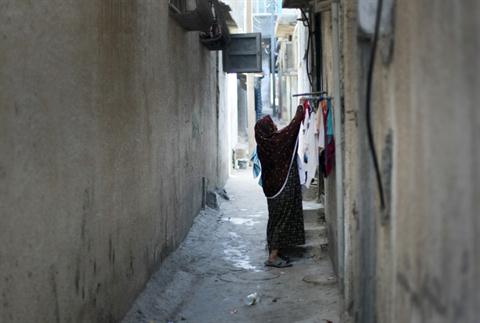
(Photo from Centre for International Governance Innovation website)
Minister of Finance Ahmed Galal stated that all programmes of the first tranche of the government’s economic stimulus package will be executed immediately after the end of the tender and bidding process.
In a meeting with a number of economic experts representing different Egyptian political parties, Galal added that this expenditure would not have significant inflationary effects on prices, since the Egyptian economy is currently operating far under capacity. The government is working to confront this problem on more than one front, the most important of which is lowering the budget deficit and overall debt levels.
Galal stated that the government aims to lower the deficit from 14% in the last fiscal year to only 10% during the current year, which he called the most important cause of rising prices. The government is also working to improve the buying power of citizens by raising the personal tax exemption limit and increasing the minimum wage level.
The minister indicated that the economic stimulus package includes programmes that aim to achieve social justice by guaranteeing economic improvement and recovery in all regions. Among these are projects to improve public services, with EGP 2.546m to develop roads and bridges, EGP 1.586bn to pave roads in the governorates, and EGP 557m allocated for the completion of 15 roads. Additionally, the programme includes EGP 523m for the national land reclamation programme, EGP 2.18bn for the national drinking water and the sewer system plan, EGP 882m to improve the environment and treat solid waste, EGP 456m to subsidise electricity and lighting grids and EGP 50m for an integrated development plan in Sinai.
Galal went on to say that the package contains EGP 590m to pay for school costs and university housing, EGP 1.48bn to increase delivery allocations of natural gas to 800,000 residential units this year, EGP 2.71bn to improve railroad crossings, EGP 273m for the second stage of the third metro line, EGP 655m to fund the purchase 600 buses for the Public Transportation Authority.
Galal affirmed the importance of the government’s intention to use the recent $12bn in Gulf aid to improve the country’s economic situation and guarantee financial sustainability. According to the minister, the government would use part of the aid to decrease public debt and the burden it places on the budget. The largest part, however, would be used to help bolster foreign reserves.
He stated that the ministry has given special attention to reforming the tax code, especially real estate tax. A number of amendments were made to the law; exemptions for residential units were increased to up to EGP 500,000, which would exempt most of the residential units in Egypt. Additionally, private family residences will be exempted up to EGP 2m and commercial and industrial units will be exempt up to EGP 100,000.
Galal said that included in these reforms is the shift from a sales tax to a value-added tax, which is considered to be the most just. Also included is a programme to reform energy subsides, which will begin its first phase with smartcards for the distribution of petrol products in order to monitor consumption and a plan under the Ministry of Petroleum to deal with energy subsides over the next several years.
The minister revealed that a new bill for comprehensive health insurance was being redrafted in cooperation with the Ministry of Health, where the government’s top priorities would include guaranteeing the sustainability of the system and improving existing health care services, rather than merely providing citizens with insurance.
The minister stated that all mechanisms and funding tools available, whether treasury bonds, Sukuk loans, or Private Public Partnership programmes, will be used depending on the economic circumstance.
In response the questions raised about late petroleum payments, the minister revealed that consultations with foreign oil companies will be used to schedule these payments; a portion will be paid before the end of the year as soon as a deal is reached. He added that there is an understanding between Egypt and its foreign partners in the oil sector with regards to the current circumstances. Galal also stressed the importance of organising explorations for oil and gas in order to increase self sufficiency and decrease imports.
The minister discussed a number of other ideas, some of the more significant including: progressive taxation; the return of an inheritance tax; a tax on oil use, similar to carbon taxes in advanced nations used to encourage the use of new and renewal energy sources; and mechanisms to attract the informal sector towards the formal sector.
Galal said that the current economic situation in Egypt, involving slow growth and contraction, is not conducive to the imposition of new taxes, but this does not prevent the government from working on suggestions for reforms to the progressive tax system, which could be implemented in the future. He affirmed that all global studies have proven that taxes are not the most important factor for attracting private investments and that most investors in Egypt are from countries linked to Egypt by treaties that prevent double taxing. Consequently, if they do not pay in Egypt, they must still pay in their own countries.
Galal also indicated that the government had obtained funding from the World Bank worth $200m for a programme to improve public services over a 100 day period.
Expressing an understanding of the potential challenges in addressing the country’s economic challenges, Galal admitted “the treatment will take years,” Adding that the government is less interested in “decisions that will bring popularity, but rather those that will benefit future generations of Egyptians.”
Among the participants in the dialogue were Basant Fahmi from the Al-Dostour Party, Dina Al-Khayat from the Free Egyptians Party, Hany Al-Husseini from Tagammu, Abdel Halim Al-Gamal from the Nour Party, Hisham Akram from the Justice Party, Hisham Ismail from the Popular Alliance, Doctor Salwa Al-Antari from the Egyptian Socialist Party, and Doctor Ashraf Hanna from the Egyptian Social Democratic Party.




